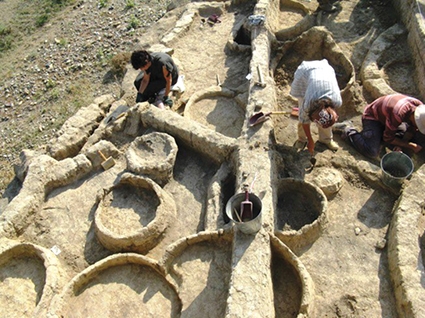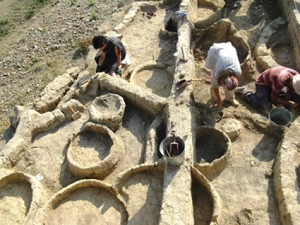New Traces of Ancient Wine Civilization in Georgia
New archaeological discoveries continue to confirm that Georgia is one of the oldest wine civilizations in the world.
The first grape seeds were discovered in Kvemo Kartli region, south-eastern Georgia, two years ago. Throughout the following years, an international team of archaeologists and students have managed to find more residential buildings, vine dust, domestic work instruments, vessels and pits dating back to 6,000 BC.
The Georgian National Museum (GNM) held archaeological digs together with the University of Toronto, Canada, in Imiri village, Kvemo Kartli region. This year young Canadian and Georgian archaeologists also got involved in the expedition within the Gadachrili Gora Regional Archaeological Project Expedition (GRAPE), organized by the GNM and University of Toronto.
GRAPE aims to popularize Georgian cultural heritage and historical disciplines connected with it, including archaeology, ethnology and paleobotany, as well as developing and popularizing the Georgian winemaking culture. “Our excavations have acquired another important function as an educational center,” said David Lordkipanidze, Director General of the Georgian National Museum and Head of the expedition.
Archaeologists say that the processing and paleobotanical study of the discovered materials is vitally important and creates a clearer picture of the ancient wine culture that existed in Georgia. Further excavations of the eastern Georgian Neolithic monuments has also proved that, with the development of agriculture, society shifted to a new stage of life, which began the process of increased agricultural awareness and animal domestication.
The joint project of the Georgian National Museum and the National Wine Agency “Research of Georgian Grapes and Wine” has been ongoing since 2014 under the patronage of the Georgian government. The first findings that year aroused great interest among both the international scientific community and the press, which also recognized Georgia as one of the most ancient wine civilizations.
Today, the project has reached a truly international level, gathering scientists and experts from numerous countries, states and institutes, including Georgia itself, Pennsylvania, Montpellier, Milan, Copenhagen, Toronto University, the Israel Vaisman Institute and the Montpelier Research Institute.
Eka Karsaulidze












